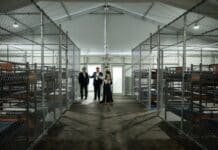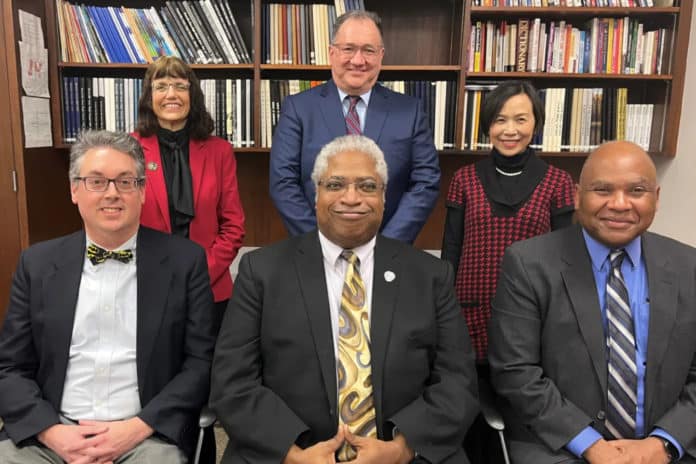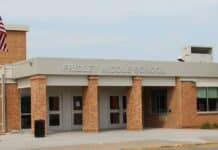A Roseville parent compared the school board’s attempt to shut down public comment at board meetings to tactics used to silence dissenters in communist countries.
Even though parents and community members overwhelmingly opposed the policy change, the board is still considering passing the measure later this month.
Instead of allowing parents and residents to speak at school board meetings, the board wants to scrap the “Community Input” portion altogether in favor of “Community Listening Sessions.”
Eight attendees spoke against the policy change and one spoke in favor during a Tuesday night board meeting.
The motion for the policy change was first proposed at an August meeting and carried unanimously. Board members will vote on the change next month.
Community listening sessions would take place 30 minutes prior to the official board meeting. The sessions would be recorded but would not be made available to the public, according to the proposed policy.
“Here’s the big picture,” a resident who asked to remain anonymous told Alpha News.
“They don’t want those recordings to be used as rallying cries. They want to get rid of the official backdrop of a school board meeting and the crowds that come with it. Last year, school board meetings were recorded all across the country. Those recordings were used as rallying cries,” she said. “They want to prevent what happened last year from happening again this school year. They don’t want these recordings used across the country via social media and news outlets. ‘Listening sessions’ lose their appeal because there’s no one in the background and only one or two board members listening.”
“Last year people spoke out at school board meetings, it was recorded and seen around the country. Those recordings galvanized people,” she added.
Here's what Roseville School Board member Mike Boguszewski thinks of public comment during board meetings. He doesn't like they have to "sit here and listen to things that we know are wrong or false and not be able to respond." pic.twitter.com/TiUj5O2gpp
— Alpha News (@AlphaNewsMN) September 15, 2022
Some of the speakers at Tuesday’s meeting said broadcasting public comment allows the whole community to get a sense of where people stand on the issues.
“Preventing the public from hearing parents and the community reminds me of what they do in communist countries like North Korea and China,” said Kofi Montzka. “It makes dissenters feel alone like they are on an island, and it makes it harder to find like-minded people.”
Currently, anyone who wants to speak at a school board meeting simply shows up 15 minutes before the meeting and puts their name on a sign-up sheet.
Under the policy change, people must fill out an online form, call the district, or send an email by 3 p.m. the day of the meeting to say they want to speak.
If there are too many speakers, the board chair has the option of ranking speakers in order of priority. Students would be prioritized first, followed by parents, staff, and district residents, in that order.
“It concerns me that the chair would have the option to prioritize speaker types, and students are prioritized over parents,” said Nathan Gale, a college student in the district. “If parents get to regulate if kids can have phones, when they can get their driver’s license or get a car, as a teenager, I’m very cautious of letting teenagers have a voice over parents in that way. To me, it’s upside down.”
Other parents called the policy change a “bad move” and said it contradicts the statement on the district’s website that encourages community involvement.
According to the statement, “Since the schools belong to the district’s residents, their involvement in major decisions affecting the district is anticipated and viewed as a valuable form of input to the board.”
The school board faced similar opposition when it endorsed the views of a left-wing parent group last April and pointed the finger at “institutionalized racism” for the death of Amir Locke.
Other districts in the state that have already implemented similar policies have promoted them to parents as an “improvement,” but they are actually an effective strategy to shut down community engagement and silent dissent, said Jill Atwood, a Roseville parent who questioned the board’s reasoning behind eliminating public comment.
“They want to silence us. What other reason could it be? They should be making it easier for parents to speak, not harder,” she said.
One of the fundamental pillars of representative government is the ability of citizens to share their concerns with the public, said one parent in attendance.
“The fact that the board is even considering this policy change is a slap in the face to every tax-paying resident of this school district,” he continued.
Others accused the school board of trying to squelch opposing voices because they can’t win on the issues.
“If it (the school board) can’t win debates on health, science, evidence, or equal input, the answer is to shut down public comment time by parents,” said Bruce Ona, a district parent.
Board member Mike Boguszewski took issue with the fact that board members aren’t allowed to respond to public comments. The board still won’t be able to respond during the listening sessions, but it at least won’t be broadcast for the public to see, he said.
“It seems to me that the real substantive difference in this change is taking away our providing a live-streamed, live broadcast soapbox for a member of the community to make their case, not to us but to other community members,” he said. “Someone could come in and say, ‘As we all know 2+2 is 5 and the earth is flat and elephants have wings and you obviously should be teaching that in your science curriculum.’ We can’t respond to that.”
Alpha News reached out to Curtis Johnson, chair of the school board, but did not receive a response.
Sheila Qualls
Sheila Qualls is an award-winning journalist and former civilian editor of an Army newspaper. Prior to joining Alpha News, she was a Christian Marriage and Family columnist at Patheos.com and a personal coach. Her work has been published in The Upper Room, the MOPS blog, Grown and Flown, and The Christian Post. She speaks nationally on issues involving faith and family.











